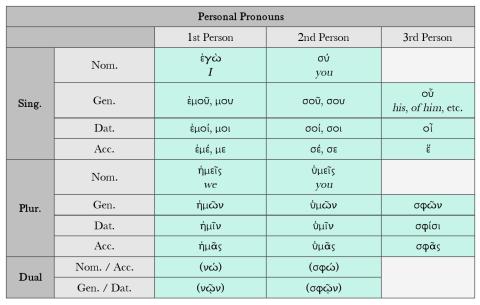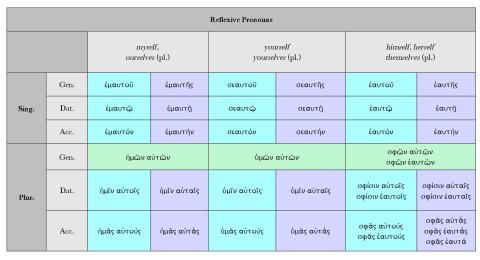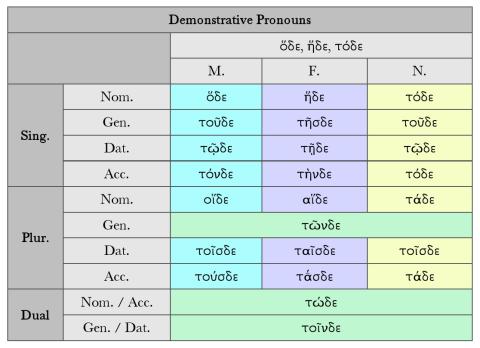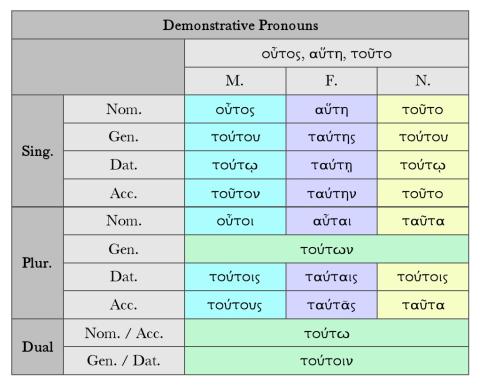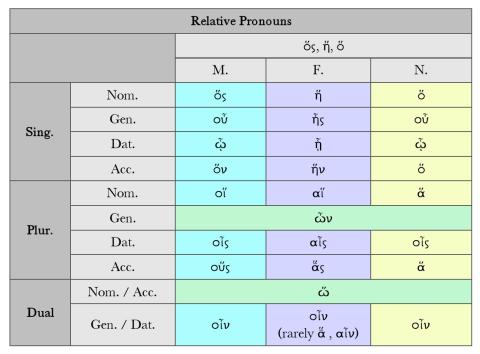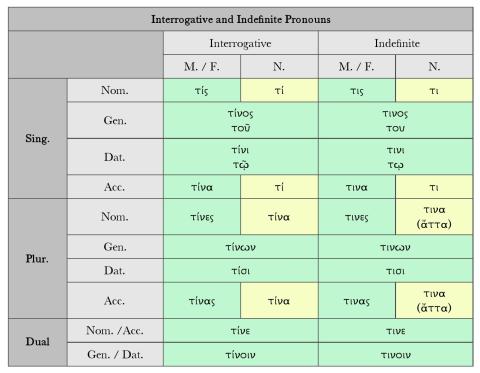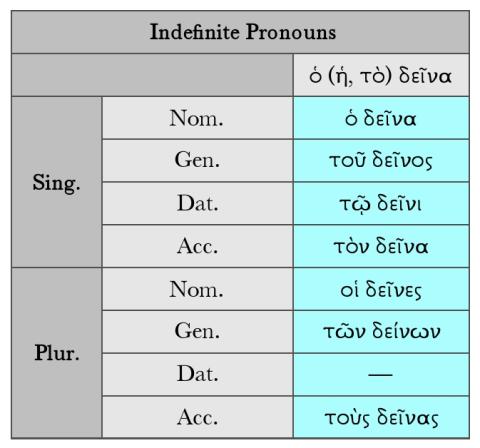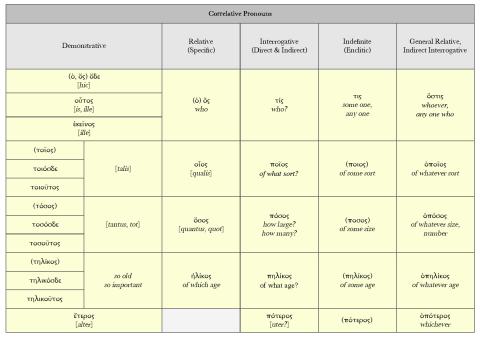1a. Δημήτριός τις εἶπε τῷ Νέρωνι· σὺ μὲν ἀπειλεῖς ἐμοὶ τὸν θάνατον, σοὶ δὲ ἡ φύσις.
1b. Διδύμων ἀδελφῶν εἷς ἐτελεύτησε· σχολαστικὸς οὖν ἀπαντήσας τῷ ζῶντι, ἠρώτα· σὺ ἀπέθανες ἢ ὁ ἀδελφός σου;
2a. Σχολαστικὸς ἀπορῶν, τὰ βιβλία αὑτοῦ ἐπίπρασκε, καὶ γράφων πρὸς τὸν πατέρα ἔλεγε· σύγχαιρε ἡμῖν, πάτερ· ἤδη γὰρ ἡμᾶς τὰ βιβλία τρέφει.
2b. Ἐν Λάτμῳ τῆς Καρίας σκόρπιοι εἶναι λέγονται, οἳ τοὺς μὲν πολίτας σφίσι παίουσιν εἰς θάνατον, τοὺς δὲ ξένους ἡσυχῇ.
2c. Κορῶναι ἀλλήλαις εἰσὶ πιστόταται καὶ πάνυ σφόδρα ἀγαπῶσι σφᾶς.
3a. Ἀνάχαρσις ὁ Σκύθης ἐρωτηθεὶς ὑπό τινος, τί ἐστὶ πολέμιον ἀνθρώποις; αὐτοὶ, ἔφη, ἑαυτοῖς.
3b. Ὁ Ζεὺς τὴν Ἀθηνᾶν ἔφυσεν ἐκ τῆς ἑαυτοῦ κεφαλῆς.
3c. Οὐδεὶς ἐλεύθερος ἑαυτοῦ μὴ κρατῶν.
3d. Νόμος οὗτος Περσικὸς, ὅταν εἰς ἀγροὺς ἐλαύνῃ ὁ βασιλεὺς, πάντες Πέρσαι, κατὰ τὴν ἑαυτοῦ δύναμιν ἕκαστος, δῶρα αὐτῷ προσκομίζουσιν.
3e. Σχολαστικὸς οἰκίαν πωλῶν, λίθον ἀπ’ αὐτῆς εἰς δεῖγμα περιέφερεν.
3f. Κριτὴς ὢν, ἀεὶ ταὐτὰ περὶ τῶν αὐτῶν γίγνωσκε, οὐδὲν πρὸς χάριν ποιῶν.
3g. Ψυχῆς ἐπιμελοῦ τῆς σεαυτοῦ.
3h. Βούλου ἀρέσκειν πᾶσι, μὴ σαυτῷ μόνον.
3i. τὸν γὰρ βουλόμενον ἀρέσκειν πᾶσι δοῦλον εἶναι δεῖ πάντων.
3j. Πάντων μάλιστα σαυτὸν αἰσχύνου.
notes
- Personal (ἐγώ, σύ): G. 194
- Reflexive (ἐμαυτοῦ, σεαυτοῦ, ἑαυτοῦ): G. 203.
- Possessive (ἐμός, σός) G. 204.
- Demonstrative (ὅδε, οὗτος, ἐκεῖνος) G. 205-212.
- Relative (ὅς, ἥ, ὅ): G. 213-216.
- Interrogative and indefinite (τίς, τις, ὅστις) G. 217-225)
- Correlative: G. 227.
1a. εἶπε: "said," 2nd aor. ind. act. > εἶπον (present supplied by φημί, λέγω, or ἀγορεύω).
τῷ Νέρωνι: the Roman emperor Nero.
ἀπειλεῖς: 2nd sing. pres. ind. act. > ἀπειλέω.
ἡ φύσις: understand after this ἀπειλεῖ θάνατον.
1b. σχολαστικὸς: "the student," the stereotypical butt of jokes preserved in the ancient Greek joke collection Philogelos, from which this sentence is drawn (no. 29). Possible English translations could include "egghead" or "braniac."
ἀπαντήσας: "having met," 1st aor. ptc. act. > ἀπαντάω.
τῷ ζῶντι: "the survivor," literally, "the one that was living"; imperf. ptc. > ζάω.
ἠρώτα: 3rd sing. imperf. ind. act. > ἑρωτάω.
σὺ ἀπέθανες: "did you die?" 2nd aor. ind. act. > ἀποθνήσκω.
2a. ἀπορῶν: "being in great want," pres. ptc. act. > ἀπορέω.
ἑπίπρασκε: 3rd sing. imperf. ind. act. > πιπράσκω.
γράφων: pres. ptc. act. > γράφω.
ἔλεγε: "said," referring to the contents of the letter.
σύγχαιρε ἡμῖν: "congratulate me," literally, "rejoice with us," 2nd sing. pres. imperat. > συγχαίρω. ἡμῖν is an associative dat. (G.525), normal with verbs compounded with σύν-.
τρέφει: 3rd sing. pres. ind. act. > τρέφω.
2b. εἶναι λέγονται: "there are said to be."
οἳ τοὺς μὲν πολίτας, etc.: "who wound their own citizens to death," i.e., who, whenever they wound any inhabitants of Latmus, sting them mortally. The expression τοὺς μὲν πολίτας σφισὶν means literally, "the citizens for them," i.e., for the scorpions.
ξένους: supply παίουσι.
2c. ἀγαπῶσι: 3rd pl. pres. ind. act. > ἀγαπάω.
3a. ἐρωτηθεὶς: "having been asked," aor. ptc. pass. > ἐρωτάω.
αὐτοὶ … ἑαυτοῖς: "they themselves to themselves."
3b. ἔφυσεν: "produced," 3rd sing. 1st aor. ind. act. > φύω.
3c. ἑαυτοῦ μὴ κρατῶν: "who does not control himself," i.e., who is a slave to his passions.
κρατῶν: pres. ptc. act. > κρατέω.
3d. οὗτος: supply ἐστί.
κατὰ τὴν ἑαυτοῦ, etc.: "bring presents unto him, each one according to his means."
3e. σχολαστικὸς: see note on 1.b, above.
πωλῶν: "offering for sale," pres. ptc. act. > πολέω.
εἰς δεῖγμα: "for a sample."
περιέφερεν: 3rd sing. imperf. ind. act. > περιφέρω.
3f. ὢν: "if you are," pres. ptc. > εἰμί.
ἀεὶ ταὐτὰ περὶ, etc: "always decide in the same way about the same things." i.e., be consistent and impartial. Literally, "decide the same things about the same."
ταὐτὰ: > τὰ αὐτὰ by crasis.
γίγνωσκε: 2nd sing. pres. imperat. act. > γιγνώσκω.
πρὸς χάριν: "through favor," literally, "with reference to favor" (see LSJ πρός C.III).
3g. ἐπιμελοῦ: "take care of," 2nd sing. pres. imperat. mid. > ἐπιμελεω, and governing the thing cared for in the gen. (G. 511.c).
3h. βούλου: "wish," 2nd sing. pres. imperat. mid. > βούλομαι.
ἀρέσκειν: pres. inf. act. > ἀρέσκω.
3i. τὸν ... βουλόμενον: "the (person) wanting," accusative after the impersonal verb δεῖ, "it is necessary for x (acc.) to y (infin.)."
3j. πάντων μάλιστα, etc.: "respect yourself most of all things." Genitive of the whole (G.507e).
αἰσχύνου: 2nd sing. pres. imperat. mid. > αἰσχύνω.
vocabulary
(1)
Δημήτριος -ου, ὁ: Demetrius
ἀπειλέω, ἀπειλήσω, ἠπείλησα: threaten
φύσις -εως, ἡ: nature
Δίδυμος -ου, ὁ: twin
σχολαστικός -οῦ, ὁ: pedant, bookish person
ἀπαντάω, ἀπαντήσομαι, ἀπήντησα: meet
τελευτάω, τελευτήσω, ἐτελεύτησα: end one's life, die
(2)
ἀπορέω, ἀπορήσω, ἠπόρησα: be at a loss, be perplexed
ἐπιπράσκω (epic for πιπράσκω), πραθήσομαι, ἐπράθην: sell
σύγχαίρω, συγχαρήσομαι, συνεχάρην: rejoice with, congratulate
τρέφω, θρέψω, ἔθρεψα: nourish, support
Λάτμος -ου, ὁ: Latmus (mountain region in Caria)
σκορπίος -ου, ὁ: scorpion
παίω, παίσω, ἔπαισα: strike, smite
ἡσυχῇ (adv.): peacefully, quietly
κορώνη -ης, ἡ: crow
σφόδρα (adv.): exceedingly, very much
ἀγαπάω, ἀγαπήσω, ἠγάπησα: love, be fond of
(3)
Ἀνάχαρσις -εως, ὁ: Anacharsis
Σκύθης -ου, ὁ: Scythian
πολέμιος -ου, ὁ: enemy
φύω, φύσω, ἔφυσα/ἔφυν: beget, produce; (2nd aor. intransitive) be by nature
κρατέω, κρατήσω, ἐκράτησα: rule, be in control of (+ gen.)
Περσικός -ή -όν: Persian
ἐλαύνω, ἐλῶ, ἤλασα: drive, march
προσκομίζω, προσκομιῶ, προσεκόμισα: bring forward
πωλέω, πωλήσω, ἐπώλησα: sell
δεῖγμα -ατος, τό: sample, proof
περιφέρω, περιοίσω, περιήνεγκα: carry around
κρίτης -ου, ὁ: judge
γίγνωσκω, γνώσομαι, ἔγνων: know, decide
χάρις -ιτος, ἡ: favor, grace
ἐπιμελέομαι, ἐπιμελήσομαι, ἐπεμελήθην (+ gen.): take care of
σεαυτοῦ -ῆς: yourself (reflexive pronoun)
βούλομαι, βουλήσομαι, — : wish, want
ἀρέσκω, ἀρέσω, ἤρεσα (+ dat.): please
δοῦλος -ου, ὁ: slave
αἰσχύνομαι, αἰσχυνοῦμαι, ᾐσχύνθην: be ashamed, feel shame

